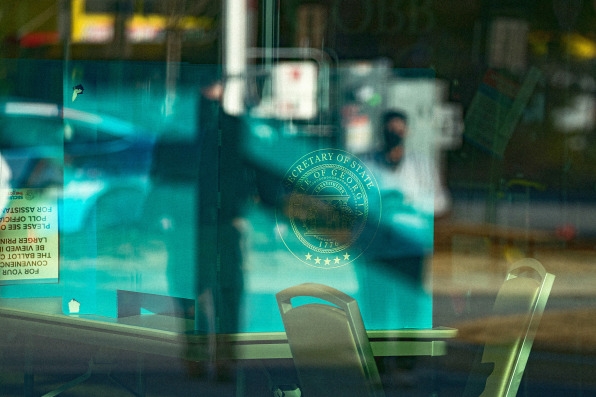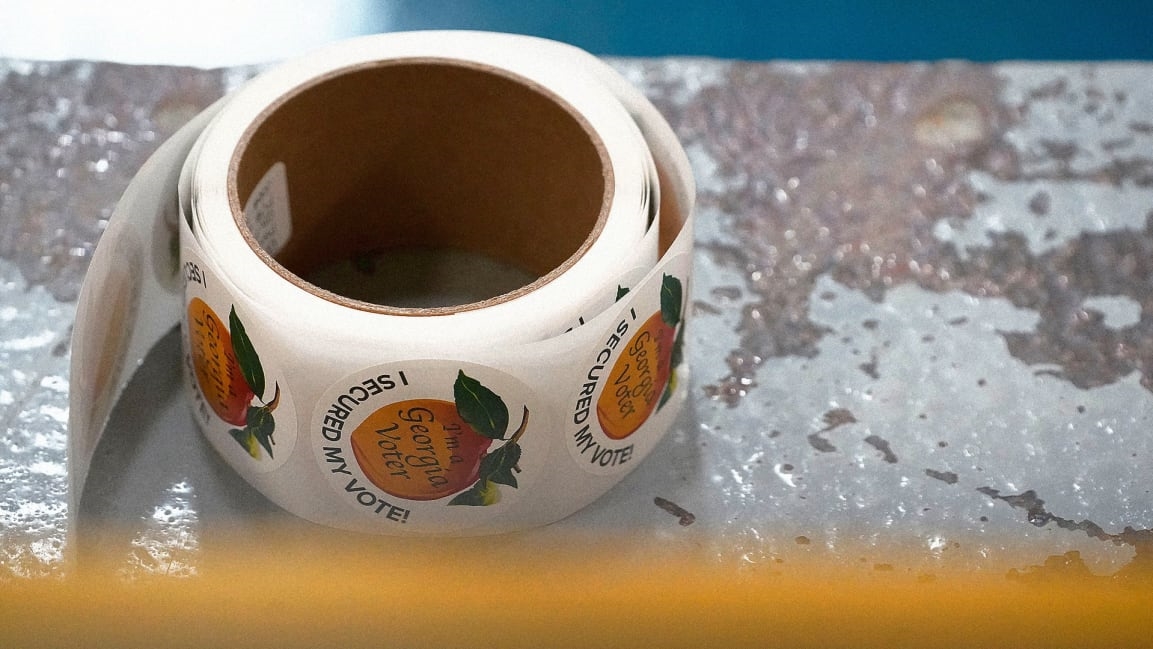‘An electoral steroid for white candidates’: the troubling history of Georgia’s runoff elections
In runoff elections, or the “two-round system,” a second election takes place if no candidate obtains a certain percentage of the vote in the first round. Those cutoff rules vary in the 10 states that have runoffs; in Georgia, they occur during both the primaries and general elections when no candidate gets 50%. Eight of the 10 states are in the South, where runoffs were part of a collection of disenfranchising tools established in order to suppress Black votes and ensure white candidates stayed in power every election cycle. “Runoffs are a vestige of the past,” says Cal Jillson, a professor of political science at Southern Methodist University, “and in the South, they certainly had racial intent behind them.”
During the first half of the 20th Century, Georgia had a unique voting system known as the county unit system, a miniature electoral college that boosted the influence of rural voters while diminishing that of Black voters in cities like Atlanta. In 1962, the system was struck down by courts, which ruled that, under the Equal Protection Clause of the 14th Amendment, there must be a “one person one vote” system that did not weigh votes from rural jurisdictions more heavily than those from urban areas.

Soon after, Georgia implemented the runoff, which already existed in much of the South, first adopted in the Carolinas in the late 1800s. A segregationist state congressman, Denmark Groover, fought for Georgia to subscribe to the system because of personal affliction after he’d previously lost an election due to what he called the “Negro bloc,” where the theory was Black voters could pool all their votes to one favored candidate, while white votes would be split among various candidates. Runoffs would ensure white candidates could beat the minority vote in a head-to-head majority contest, rather than a plurality contest with more candidates. Two decades later, Groover plainly admitted his reasoning for the system: “If you want to establish if I was racially prejudiced, I was,” he said. “If you want to establish that some of my political activity was racially motivated, it was.”
Many times, the white supremacist values that helped launch the system have presented themselves exactly as they were originally intended. In 2006, David Burgess, a Black candidate for public service commissioner, won the general election by 2.6%, but was defeated in the runoff by 4.4%. This time around, Democratic candidate Reverend Raphael Warnock won the general election in November, beating Republican Senator Kelly Loeffler by seven percentage points—but still must face Loeffler in the head-to-head contest. Still, some argue that runoffs are a fairer system than a plurality vote; had the November election stood as final, Warnock would have won with just 32.9% of the total vote, versus Loeffler’s 25.9%.
This race was complicated further by the fact that it’s a special election, which has slightly different rules, most notably that multiple candidates from both parties can run together. That’s why Warnock and Loeffler faced 18 other opponents, most notably Republican Doug Collins, who arguably split Loeffler’s vote with 20% of the tally. This is also known as a “jungle primary,” where a candidate can be elected outright in a mixed-party primary if they win the majority. In more traditional races, there are primary and general runoffs. Jon Ossoff was elected via the initial Democratic primary because he won more than 50%; Perdue went to a Republican primary runoff as he did not secure the majority. The general runoff is now taking place because neither candidate reached 50% in the November general election.
Some experts also argue that runoffs have other benefits. According to a National Conference of State Legislatures post, runoffs are implemented as a way to counter one-party rule: that they’re “intended to encourage candidates to broaden their appeal to a wider range of voters,” and “to reduce the likelihood of electing candidates who are at the ideological extremes of a party.” Two of the states that have runoffs are Vermont and South Dakota, but only in special circumstances: Vermont only conducts them if elections end in a tie, and South Dakota only if no candidate reaches 35%. In these cases, Jillson says, they serve a democratic purpose in ensuring that nobody who doesn’t have the support of the majority of voters would take office.
But in the South, Jillson adds, the democratic justification is an incomplete argument. “It’s important to see the runoff as one of several elements in an election system designed to suppress the black vote.” He points to other measures of successful disenfranchisement in the Jim Crow South, such as poll taxes, literacy tests, and grandfather clauses, all of which Georgia used to have. Runoffs are another one of these tools. “The runoff does serve democratic purposes, in the sense that it requires 50%, plus one, to win an election,” he says. “But it’s also a defense of white supremacy.”
It’s worth noting that in the other race, David Perdue marginally beat Jon Ossoff in the general election by 1.8%; the runoff is essentially a do-over. If Perdue wins the runoff, it will prove itself as a fair method in this case. Jillson suggests that other runoff methods such as the “instant runoff”—more commonly known as rank-choice voting—where voters rank their candidates in order of preference on the ballot, would be fairer still. Other states have other systems altogether, such as the “top-two primary,” now commonplace in California and Washington, where all candidates run together in a single primary, which means that the two most popular face each other in the general election, even if they’re of the same party.
“I’d be happy to see them go,” Jillson says of traditional runoffs. “I think they’re perverse in some states.” He says they probably don’t have such an impact on fairness anymore in Georgia, or in North Carolina or Texas, where legislatures are becoming more balanced between the parties. But, they’re likely still very harmful in blocking Black candidates in “overwhelmingly Republican” states like Alabama and Mississippi. But he doubts they’ll be scrapped anytime soon.
In 1990, the U.S. Department of Justice sued Georgia in order to do just that. John Dunne, the then-Assistant Attorney General for Civil Rights, said the runoff system had “a demonstrably chilling effect on the ability of Blacks to become candidates for public office”—and called it “an electoral steroid for white candidates.” The lawsuit was unsuccessful.
(44)



